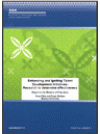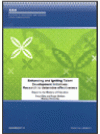This report presents the findings from research involving five Talent Development Initiatives for improving outcomes for gifted and talented students or their teachers. The purpose of the research was to consider how well the objectives of each participating initiative had been achieved, how the initiative contributed to improved outcomes for gifted and talented learners or their teachers, and how planning to continue to meet the learners’ needs after 2008 had been considered.
Purpose
The research aimed to determine:
- How providers design, implement, maintain, and evaluate programmes for gifted and talented students, or their teachers.
- How providers structure relevant and engaging learning and growth opportunities for gifted and talented students, or their teachers, as evidenced in the achievement of programme objectives; improved outcomes for students, or their teachers; impact upon key stakeholders; and planning for sustainability.
- How, and what, formative feedback effects the development, implementation, maintenance, and evaluation of programmes for gifted and talented students, or their teachers, by using an action research approach to evaluation.
Key Results
The research concludes:
- There is no set formula to gifted and talented education programmes; however, guiding principles are transferable and applicable across a continuum of approaches.
- There is variability in the transformation of principles to practice, and this is an important part of the developmental process of determining the most effective approaches.
- One-size-doesn’t-fit-all in the development, implementation, maintenance, and evaluation of gifted and talented programmes.
- Needs-based approaches enable the shaping of programmes matched to stakeholder needs.
- Conducting programme evaluations and being responsive to the findings leads to programme improvement.
- Enablers to meeting programme objectives and evidencing growth in outcomes include: having a passionate, committed programme director with knowledge and skills in gifted and talented education; documenting and planning the programme in writing; ongoing evaluation and reflective practice; physical, human, and financial resources; using a team approach; open communication with stakeholders; and making connections between teacher and learner outcomes.
- Barriers included changes in personnel; changes between the TDI proposal aims and the aims negotiated for the contract and the focus of the TDI not realigning with the negotiated aims; and lack of expertise and support in determining appropriate outcomes and indicators during programme development. In some cases, the negotiated contract aims were not well understood by providers, seen as their programme priorities, conceptualised by programme leaders or easily measurable given programme aims.
- Programme documentation, professional development and support, and ongoing evaluation enable sustainability, and potentially transferability. The financial sustainability of these programmes is untenable in most cases.
- The use of a participatory action research approach was proven useful and instrumental in ongoing programme development and evolution.


